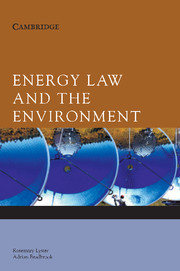Book contents
- Frontmatter
- Contents
- List of figures & tables
- Table of cases
- Table of statutes
- Preface
- 1 Overview of energy production and use in Australia
- 2 Energy technologies and sustainable development
- 3 Energy, international environmental law and sustainable development
- 4 Predicting the RPP for any given year
- 5 Sustainable energy in the Australian electricity and gas sectors
- 6 State government initiatives on energy and the environment
- 7 A sustainable energy law future for Australia
- Appendix A Draft non-legally binding Statement of Principles for a Global Consensus on Sustainable Energy Production and Consumption
- Appendix B Draft Protocol on Energy Efficiency and Renewable Energy to the United Nations Framework Convention on Climate Change
- Index
Appendix B - Draft Protocol on Energy Efficiency and Renewable Energy to the United Nations Framework Convention on Climate Change
Published online by Cambridge University Press: 05 June 2012
- Frontmatter
- Contents
- List of figures & tables
- Table of cases
- Table of statutes
- Preface
- 1 Overview of energy production and use in Australia
- 2 Energy technologies and sustainable development
- 3 Energy, international environmental law and sustainable development
- 4 Predicting the RPP for any given year
- 5 Sustainable energy in the Australian electricity and gas sectors
- 6 State government initiatives on energy and the environment
- 7 A sustainable energy law future for Australia
- Appendix A Draft non-legally binding Statement of Principles for a Global Consensus on Sustainable Energy Production and Consumption
- Appendix B Draft Protocol on Energy Efficiency and Renewable Energy to the United Nations Framework Convention on Climate Change
- Index
Summary
Preamble
The Parties to this Protocol:
Being Parties to the United Nations Framework Convention on Climate Change, hereinafter referred to as ‘the Convention’,
Guided by the pertinent provisions of the Declaration of the United Nations Conference on the Human Environment, adopted at Stockholm on 16 June 1972, the World Charter for Nature, the Rio Declaration on Environment and Development, Agenda 21: Programme of Action for Sustainable Development, the Johannesburg Declaration on Sustainable Development and Plan of Implementation, and other relevant instruments and fundamental principles of international environmental law,
Mindful that current patterns of energy use and production, based primarily on non-renewable energy resources, are responsible for more than two-thirds of all atmospheric carbon emissions, and are a major source of acid rain and ozone-depleting substances,
Reflecting the urgent concern of the international community, including States and international organizations, about the adverse environmental impacts of the continued use of non-renewable energy resources,
Conscious that the right to development must be fulfilled so as to meet the developmental and environmental needs of the present and future generations in a sustainable and equitable manner,
Conscious also of the importance and necessity of international cooperation and partnership in promoting the use of energy efficiency and renewable energy technologies,
Bearing in mind the contribution that promoting the use of energy efficiency and renewable energy technologies can make to achieving the objectives of the United Nations Framework Convention on Climate Change and the Kyoto Protocol,
Recognizing also the importance of the provision to developing countries of effective means,
- Type
- Chapter
- Information
- Energy Law and the Environment , pp. 215 - 232Publisher: Cambridge University PressPrint publication year: 2006
- 1
- Cited by



